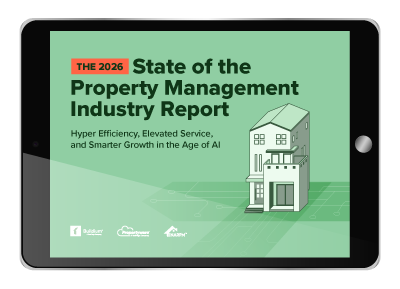The job of a property manager will not be the same a year from now.
Chart of Accounts
Want clearer, cleaner books? What about a more useful view into your properties or just easier accounting in general?
Get the GuideWhy is the role evolving so quickly? Throughout 2019, property managers have been at the center of the collision between rising rental demand, declining profitability, changing regulations, and the nationwide housing shortage. Technology has fundamentally transformed their interactions with residents, owners, and employees. The waxing and waning of the real estate cycle has reshaped their local markets and their clients’ portfolios.
Any one of these things alone would be a big change. Combined, these forces—along with the immediate demands of their owners and residents—are transforming property managers’ jobs for good.
Let’s take a look at the 4 forces that will shape the role of the property manager in 2020, and what property managers can do to survive (and thrive) in the year to come.
#1: Property managers will take on a more consultative role for their clients as new regulations put immense pressure on profitability.
Housing affordability made headlines all throughout the past year. As housing costs burden a troubling number of residents, policies to more strictly regulate rental markets will be on the table in cities and states across the country in 2020. In the year to come, property managers will face the challenge of balancing the profitability of their clients’ investments with rent prices that keep units filled with qualified residents and practices that adhere to the new laws.
It remains to be seen which cities and states will be next to pass regulations to address housing affordability; but so far, rent control policies have been passed into law in California, New York, and Oregon. Property managers operating in cities where rent growth has far outpaced income growth (and that don’t have rent control preemptions in place) are most likely to feel the pain.
How Should Property Managers Respond?
Many property managers fear that regulatory changes will damage the appeal of investing in rental properties at a time when profitability is already a battle. But in all of this complexity, there’s an opportunity for property managers: We believe that they’ll come to play a critical consultative role as regulations create an increasingly intricate legal landscape for rental owners. By staying on top of changes in their local market, property managers can market their expertise as a must-have resource for their clients’ businesses, helping them determine how to operate their properties legally and profitably no matter which curve balls regulation throws their way.
#2: Property managers’ local market expertise will be coveted by investors as high-yield markets shift rapidly.
Smart investment picks are constantly changing as we reach the end of the current real estate cycle. With cap rates compressing and regulations increasing in overheated primary markets, investors are discovering higher yields and faster growth in mid-sized cities and suburbs. However, as investors have rushed into thriving cities like Austin and Nashville, prices have ballooned and cap rates have rapidly compressed. This has split investors’ interest between safe bets and each new year’s up-and-coming markets over the last few years.
We expect that the escalating housing shortage and slowing population growth in traditionally popular cities will continue to drive real estate investors’ interest toward secondary markets in 2020. Cities that are thriving at this point in the cycle have certain characteristics in common: strong job growth across multiple industries; housing costs that balance affordability for residents with price growth for investors; and population growth that eclipses that of primary markets.
How Should Property Managers Respond?
For property managers, awareness of local trends matters more than ever as the picture of profitability and affordability evolves in cities across the country on a near-constant basis. They can be an invaluable asset to local and remote investors alike by keeping a finger on their area’s pulse and ensuring that their properties are positioned to attract and retain high-quality residents. Property managers who are skilled in asset management and market analysis will be in high demand as investors seek out partners who are prepared to help them adapt their portfolios in response to shifts in the rental market.
#3: Property managers will need to balance the role of technology with the importance of the human touch in their customer experiences.
As technology continues its radical transformation of the real estate industry, innovations like automated showings, maintenance request tracking, and online payments have put days’ worth of time back into property managers’ schedules each month. However, property managers know that relationships are still at the heart of what they do—it just takes some extra thought to ensure that technology doesn’t unintentionally remove the chances for human connection that used to be an inherent aspect of property managers’ work.
This issue is on property managers’ minds now more than ever as landlords have begun to discover these new technologies for themselves. Property managers are working harder to win over potential clients who believe that technology is all they need to manage their own units effectively. Still, so much of what property managers do simply can’t be automated: Their personal expertise makes a quantifiable difference through keeping units filled with great residents, averting expensive maintenance emergencies, improving properties’ profitability, and freeing up property owners’ time.
Technology is no longer an aspect of how we live—it is how we live.
Across all industries, it’s never been more important for businesses to reinvent their strategies to account for their customers’ concerns and preferences. Technology is no longer an aspect of how we live—it is how we live; and having so much information and so many methods of communication at our fingertips has drastically changed our expectations as consumers. Today’s renters and owners expect real-time responses and solutions, and are dissatisfied when property managers don’t provide the personalized level of service they’ve grown accustomed to in other areas of their lives.
How Should Property Managers Respond?
The property managers who succeed in this new decade will be those who provide an empathy-driven, tech-enabled experience to their customers. Automation frees up property managers’ time to focus on higher-order concerns, like improving the amount and quality of the interactions they have with their customers, and providing more personalized services to reinforce the importance of relationships to their business. Property managers know that the human element of their jobs can never be outsourced—the trick in 2020 will be to let technology enhance, rather than replace, relationships in the right proportion.
#4: A softening housing market will create a surge of interest in renting and the property management profession.
In 2020, we expect the housing market to slow and the rental market to thrive—but the picture is more complicated than a shift in demand from owning to renting, and could have some unexpected impacts for property managers.
Here’s what’s going on:
For years, there’s been a mismatch between the housing that a majority of renters and buyers need, and the type and amount of housing that’s actually being built. Markets across the country are seeing a surplus of luxury housing, which is more profitable for developers in the face of rising construction costs. At the same time, there’s an estimated shortfall of 1 million low- and mid-priced units, which has caused prices to rise on the limited supply of affordable homes.
Housing affordability shows no signs of getting better, even with a recession predicted by 2021. As the economy softens, strong demand for the limited supply of homes could continue to drive prices up. In another scenario, demand for homes could drop as a recession stops even more Americans from being able to afford rising prices—causing home sales and prices to flatten or fall, but failing to impact the relative affordability of housing for the average American. In addition, a recession could slow the rate of construction on non-luxury housing even further.
A recession won’t damage renting’s popularity. More Americans are renting their homes than ever before, both because of the flexibility it provides, and financial realities that prevent many from becoming homeowners. Economic uncertainty could cause even more Americans to hold off on buying a home. All in all, 1 million new rental households are expected to form each year over the next decade.
A recession will worsen the housing shortage, causing problems for property managers, owners, and renters alike. Half of renter households are already struggling to afford housing costs, and the shortage of low- and middle-income units under construction will continue to push up prices, potentially worsening when a recession hits. Rental demand is stronger than ever—for a very specific kind of housing. Property managers whose units warrant rents higher than the average resident can afford may have a hard time finding qualified tenants.
Rental demand is stronger than ever—for a very specific kind of housing.
How Should Property Managers Respond?
As interest in renting continues to rise, two things could happen. First, property managers whose portfolios focus on affordable and workforce housing will see a steady stream of income and strong occupancy rates as they give millions of Americans a place to call home. Property managers who go a step further to create an empathy-driven, tech-enabled experience for residents will see the benefits in the form of lease renewals and referrals in the years to come, helping to ease profitability concerns.
Second, the thriving rental market could attract new professionals to the property management industry. Many small-business property managers are already concerned about the onslaught of industry consolidation and DIY landlords managing their rentals with apps; so the potential for new property managers entering the field at this point in time can feel like a threat.
However, it’s important to remember that today’s property managers know the opportunities and challenges of this industry inside and out. In 2020, the property managers who win will be those who are at the forefront of these changes, leveraging their hard-won expertise to help their clients to stay profitable in a shifting market, and approaching customer service with equal parts technology and empathy.
The 2020 State of the Property Management Industry Report
In our annual report on the state of the property management industry, we dig even further into the ways that property managers’ roles will evolve as rising rental demand, declining profits, changing regulations, and the housing shortage collide. Download the 2020 State of the Property Management Industry Report to discover how property managers can:
- Seize success in the face of changing conditions in rental markets across the U.S.
- Take on a new role for their clients as major cities face a less profitable, more regulated future
- Balance the need for ever-increasing efficiency with empathy-driven customer service



